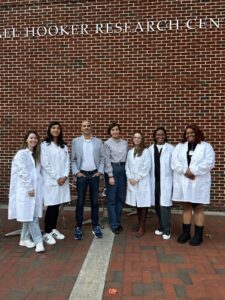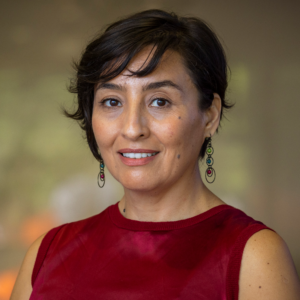The People
Shaikh Lab 2023

Raz Shaikh, PhD

Raz Shaikh is an associate professor with more than 10 years of experience as a researcher, who specializes in the study of how dietary fatty acids and their metabolites regulate immunological and metabolic responses in obesity, Type 2 diabetes and cardiovascular diseases.
Dr. Shaikh currently is focusing his expertise on understanding how metabolites synthesized from dietary n-3 polyunsaturated fatty acids, known as specialized pro-resolving lipid mediators (SPMs) can be developed to enhance the function of antibody secreting B cells in pre-clinical and clinical models of health and disease. He also is working on ways to improve the function of mitochondria, which are the energy producing hubs in a cell. Finally, he is conducting a clinical study on diet and inflammation.
Meagan Bridges, M.S

Meag Bridges manages the UNC Nutrition Obesity Research Center’s (NORC) Animal Metabolism Phenotyping (AMP) Core. She earned her Bachelor of Science degree in Biology with a minor in Chemistry from Savannah State University. In 2020, she earned her Master of Science degree in Biology with a minor in Computational Science and Engineering from North Carolina Agricultural and Technical State university. There, she was a Bridge to Doctorate Scholar. Her research investigates omega-3 fatty acids and polyunsaturated fatty acid (PUFAs) metabolites influence on gut permeability and immunoresponse (in vivo), and plasma membrane organization (in vitro). Meagan’s long-term career interest is to become an independent, principal investigator.
Outside of lab, Meagan is passionate about animal health and welfare, and she volunteers as a Veterinary Assistant. In her free time, she enjoys quality time with her pets and her nieces and nephews, baking, reading and attending film festivals and live music shows.
Ximena M. Bustamante-Marin, PhD

Assistant Professor of Nutrition, Shaikh Lab
Dr. Bustamante-Marin earned her PhD in Biological Sciences with mention in Physiology from Pontifical Catholic University of Chile. After completing a Research Scholar training at Duke University and a postdoctoral appointment in the Cystic fibrosis Department at UNC, Dr. Bustamante-Marin joined the Gillings School’s Department of Nutrition in July 2019 as a Research Assistant Professor. Her research focuses on comprehending the effects of obesity on the function of the primary cilium in breast cancer cells and the consequences of the enrichment of cilia on the tumor microenvironment, metabolic reprogramming, and metastatic potential. She is also investigating the impact of obesity on the composition of extracellular vesicles derived from mammary tumors, and how the content of extracellular vesicles can modify metabolic pathways. Understanding the effects of obesity on the function of the primary cilium and in the composition of extracellular vesicles could generate opportunities for early detection and clinical interventions during breast cancer development.
Rafia Virk, M.S

Rafia is a third-year Ph.D. candidate in Shaikh’s Lab with a background in nutrition and biochemistry. Her research interests involve exploring the interplay of essential nutrients, inflammation, and disease pathology. Currently, her research is focused on exploring the initiation and resolution of inflammation in acute lung injury (ALI) with respect to levels of omega-6 (n-6) and omega-3 (n-3) polyunsaturated fatty acid (PUFA) metabolites. This research involves utilizing various mice models, which include but are not limited to diet-induced obese mice, genetically obese mice (ob/ob), and receptor knockout mice. Our lab has collaborated on, and is working on, the following ALI models: LPS-induced ALI, Breast cancer lung metastasis, and Ozone-exposure ALI. Our goal is to explore the mechanisms behind ALI as it relates to specialized pro-resolving lipid mediators (SPMs) which are derived from n-6 and n-3 PUFA metabolites.
Brooke McAleer, M.S

Brooke is a third-year Ph.D. candidate in the Shaikh lab with a background in nutritional science and genetics. She is interested in studying the collective relationship between nutrition, genetics, and inflammation. Specifically, investigating the molecular mechanisms by which the balance of these relationships can lead to disease manifestation. Her current research involves studying how the metabolic pathway of specialized pro-resolving mediators (SPMs), metabolites of omega-3 fatty acids, and their corresponding receptors contribute to the resolution of lung inflammation. The project looks at mouse alveolar macrophages together with acute lung injury (ALI) mouse models (LPS-induced and breast cancer lung metastasis) to examine the effects of SPMs on macrophage mediated inflammation.
Nari Beatty

Nari Beatty is a second-year Master’s student in Dr. Shaikh’s lab. She obtained her Bachelor’s Degree from UNC Greensboro in 2022, with a research background in Nutrition Science and Biology. As an undergraduate research assistant, she conducted research examining how an excessive intake of high-fat diets and/or sugary foods dysregulated brain function and food intake behaviors via dopamine signaling in mouse models. Along her master’s journey at UNC-Chapel Hill, she aspires to cultivate and further advance her interests and knowledge upon how omega-3 and omega-6 polyunsaturated fatty acids contribute to the initiation and resolution of inflammation amongst various acute diseases.
Rosemary Gray, M.S
Rosemary is a first-year Ph.D. student studying Nutrition and Biochemistry. Before starting the Ph.D. program, she worked as an intern in the Shaikh Lab while completing a master’s degree in human nutrition. Her interests involve dietary fatty acids and how various phospholipids influence plasma membrane structure and cell signaling. Rosemary most recently contributed to work investigating the role of DHA in lipid raft formation and the downstream immune outcomes in alveolar macrophages. Her current work explores whether perfluorinated compounds can alter lipid raft organization and influence humoral cell signaling. Rosemary earned bachelor’s degrees in philosophy and literature from the College of Idaho and spent over 15 years as a fine wine consultant in NYC before pursuing a second career in Nutrition research.
Aurora Poisson – Federal Work Study Student
